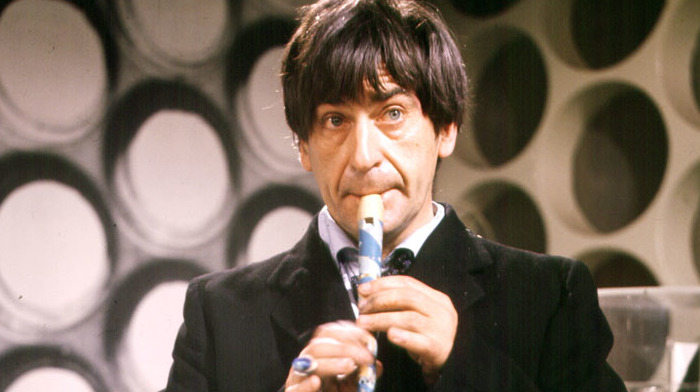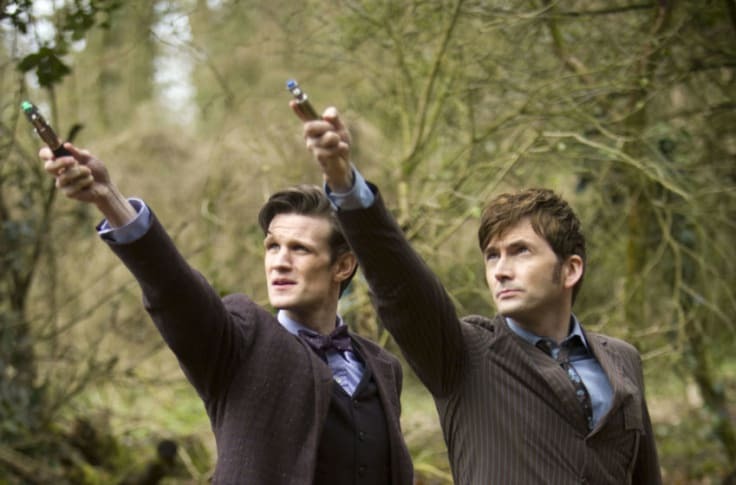Why Do 'Doctor Who' Actors Usually Leave After 3 Seasons?
For all its whimsy and joy, Doctor Who is honestly just a story built on sadness. The much-beloved British sci-fi series guarantees its fans pain by cycling out its cast every so often and marking their departures with bittersweet (if not overtly sad) goodbyes.
So no one should be surprised to learn that another farewell is on the horizon: BBC recently announced that Thirteenth Doctor Jodie Whittaker would be stepping down from the titular role, after three seasons.
Three seems to be a magic number in this series: Whittaker isn't the only Time Lord to turn in their sonic screwdriver after just three seasons. The long list includes William Hartnell, Patrick Troughton, Peter Davison, Sylvester McCoy, Matt Smith, and Peter Capaldi. Each departed for various reasons, of course, some more fraught than others — Hartnell cited health reasons and McCoy's time in the TARDIS ended when the original series was canceled in 1989. But the three-year trend is still notable, and has even earned a title: the infamous "Three-Season Rule."
Is the "Three-Year Rule" Real?
Back in the years of Classic Who, Second Doctor Patrick Troughton began his run by warning producer Peter Bryant that he planned to stick around for only three seasons. His reason? Fear of being typecast.
The second Doctor was nicknamed the Cosmic Hobo for good reason: he was scruffy, warm, and a bit bumbling. Troughton worried that portraying the Doctor for several years would wreck his long-term career prospects and pull him out of the running for dramatic and serious roles.
To be fair, Troughton's fear was very much rooted in reality. Doctor Who is such a staple part of British culture (not to mention its growing popularity overseas), so it doesn't take very long for an actor to be associated with the character's defining characteristics. I, for one, still refer to Matt Smith as "my Doctor," and there's no shortage of fans who immediately think back to his Who years upon seeing his name in a headline. It's quite possible that Smith shared in Troughton's fear, along with other Who performers who took up the mantle.
There have been exceptions, of course: the Third Doctor Jon Pertwee stuck around for five seasons, while Tom Baker, arguably the most popular Doctor, stayed on for a whopping seven seasons — the longest tenure of any Doctor Who star. However, even they could not escape being typecast.
Unofficial as it is, the three-year rule continues to persist for good reason. The Doctor is a demanding role — physically speaking, he does a lot of running away, what with all those alien attacks. But in all seriousness, seasons of Who used to span up to 40 episodes in the classic era, and while that was never the case for new Who, even the 13-episode runs had demanding filming schedules.
Playing the beloved character eats up an actor's schedule and doesn't leave room for much else. After three years, many of the actors feel ready to move on to something new.
Can Doctor Who Actors Escape Being Typecast?
The Doctor is distinct for his silly, whimsical nature, which becomes a difficult image to escape. But it's certainly not impossible.
To their credit, Tenth Doctor David Tennant and Eleventh Doctor Matt Smith have managed to dodge the scourge of typecasting by going out for roles that showcase completely different sides of themselves. In Tennant's case, it helps that his career was already on the rise.
Tennant has since gone on to play equally grand roles that are just as magnetic and easy to associate him with. Not to mention how completely different they are from his run as Ten. We've seen Tennant as a tortured detective in Broadchurch, a literal demon on Good Omens, one of the most reprehensible villains to date on Jessica Jones, and in the much lighter territory, he even voices the grumpy Scrooge McDuck on DuckTales.
Matt Smith's career has gone in a similar direction. While he occasionally dabbles in the world of whimsy (as with the comedic highlight in Pride and Prejudice and Zombies), his most memorable role to date has been as Prince Phillip in The Crown. Other than his face, Smith's Phillip bears zero resemblance to his cherry, bubbly doctor and spends most of his time whining about the spotlight. Not too much has been revealed about his upcoming role in the Game of Thrones spin-off, House of the Dragon, but I'm guessing he won't be wearing any bowties.
Peter Capaldi, who was already an established character actor long before he stepped into the blue box in 2014, has had no shortage of post-Who roles either, appearing in films like Paddington, The Personal History of David Copperfield, and most recently, as a foul-mouthed villain in The Suicide Squad.
Keeping with the trend, Jodie Whittaker now has the freedom to dive into darker roles! Just talking about it feels jarring — she just spent the last three years in a rainbow-striped T-shirt and suspenders. The Thirteenth Doctor is a pillar of warmth and kindness, with her defining characteristic being generosity... But as Doctor Who has taught us, people change! Now, it's Whittaker's turn to beat typecasting and launch headfirst into a new era of her career.


